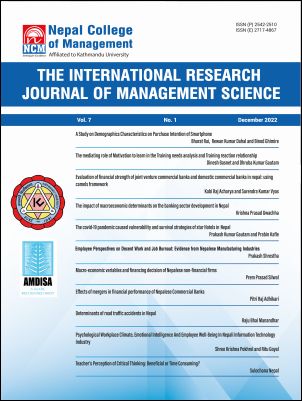The mediating role of Motivation to learn in the Training needs analysis and Training reaction relationship
DOI:
https://doi.org/10.3126/irjms.v7i1.50609Keywords:
Training needs analysis, motivation to learn, training reaction, mediating analysis, Structural equation modelingAbstract
Propose – Most of the training evaluations are based on trainees’ reaction but rare research has been done on training reaction as a training outcome. In addition, Insurance companies’ employees have also shared the similar anecdotes. Based on the evidence and phenomenology, the aim of this study is to examine the training reaction via. training needs analysis and motivation to learn.
Design/ Methodology/ Approach - The philosophical perspective of this study are single reality (ontology) and positivist epistemology. Descriptive research design was used to know the current status and casual research design was used for examining the impact among exogenous, intervening and endogenous constructs. In this study, reliability, exploratory and confirmatory factor analysis were checked by using 203 questionnaires and confirmed for acceptable reliability, validity and model fit of the constructs. For robust analysis, structural equation modeling was employed and to validate the finding, PROCESS macro and Sobel test were employed and found the similar results.
Finding - The study found positive relationship among training needs analysis and motivation to learn; motivation to learn and training reaction; and training needs analysis and training reaction. Moreover, the study confirmed that motivation to learn mediates the relationship between training needs analysis and training reaction which concludes that the positive training reaction and motivation to learn are the expected outcomes from well-designed training program.
Practical Implication – Practicle implication for insurance companies have been presented in this study, thereby the insurance companies could increase the performance and the motivation level of employees.
Original Value – This research paper validate the proposed training needs analysis, motivation to learn, and training reaction construct that provide the empirical evidence for building a strong theory.




